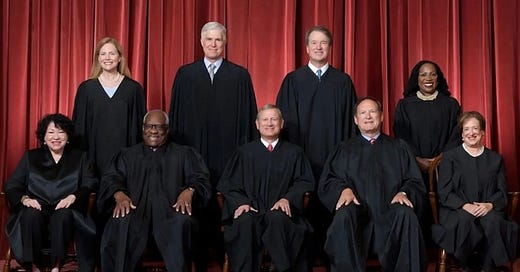ICYMI: Two Big Rulings (& Wins) From Supreme Court: January 6th Case, and Chevron Reversal
By Sundance
In a major 6-3 ruling, the Supreme Court has finally addressed the expansive regulatory use of executive agencies to create law through interpretation. The 40-year-old Chevron ruling granted the executive agencies of government the ability to interpret laws and apply restrictions/regulations based on their own rules and definitions therein. The Supreme Court put the judicial branch back into the equation by ruling that courts will now decide what laws apply when the legislative details are ambiguous. This shift in prior precedent could have major ramifications.
In another big case, the court ruled in favor of Joseph Fischer a Pennsylvania police officer charged in the January 6th protest with “obstructing an official proceeding.” Read Ruling
The law at the center of Fischer’s case is 18 U.S.C. § 1512(c)(2), and as noted by Julie Kelly, “The statute … has been applied in roughly 350 J6 cases; it also represents two of four counts in Special Counsel Jack Smith’s J6-related criminal indictment of Donald Trump in Washington.”
Julie Kelly – […] In a 6-3 decision, Chief Justice John Roberts wrote that the “c2” subsection is tethered to the “c1” subsection that addresses tampering with a record, document, or “object.”
Roberts was joined by Justices Clarence Thomas, Samuel Alito, Neil Gorsuch, Brett Kavanaugh, and Ketanji Brown Jackson. Justice Amy Coney Barrett authored the dissent (!) joined by Elena Kagan and Sonia Sotomayor.
Today’s decision means hundreds of Americans have been wrongfully prosecuted by Attorney General Merrick Garland as he insists his department is dedicated to upholding the “rule of law” and pursuing justice “without fear or favor.” (read more)
The DOJ now has to figure out how it will respond to losing the majority charge in many of the J6 cases. However, the DOJ immediately responded with the following press release:
MAIN JUSTICE – The Justice Department issued the following statement from Attorney General Merrick B. Garland on the Supreme Court’s decision in Fischer v. United States:
“January 6 was an unprecedented attack on the cornerstone of our system of government — the peaceful transfer of power from one administration to the next. I am disappointed by today’s decision, which limits an important federal statute that the Department has sought to use to ensure that those most responsible for that attack face appropriate consequences.
The vast majority of the more than 1,400 defendants charged for their illegal actions on January 6 will not be affected by this decision. There are no cases in which the Department charged a January 6 defendant only with the offense at issue in Fischer. For the cases affected by today’s decision, the Department will take appropriate steps to comply with the Court’s ruling.
We will continue to use all available tools to hold accountable those criminally responsible for the January 6 attack on our democracy.” (read more)
Harvard Professor Emeritus Alan Dershowitz said the Supreme Court was correct in its ruling to make it harder to charge Jan. 6 defendants with obstruction.





